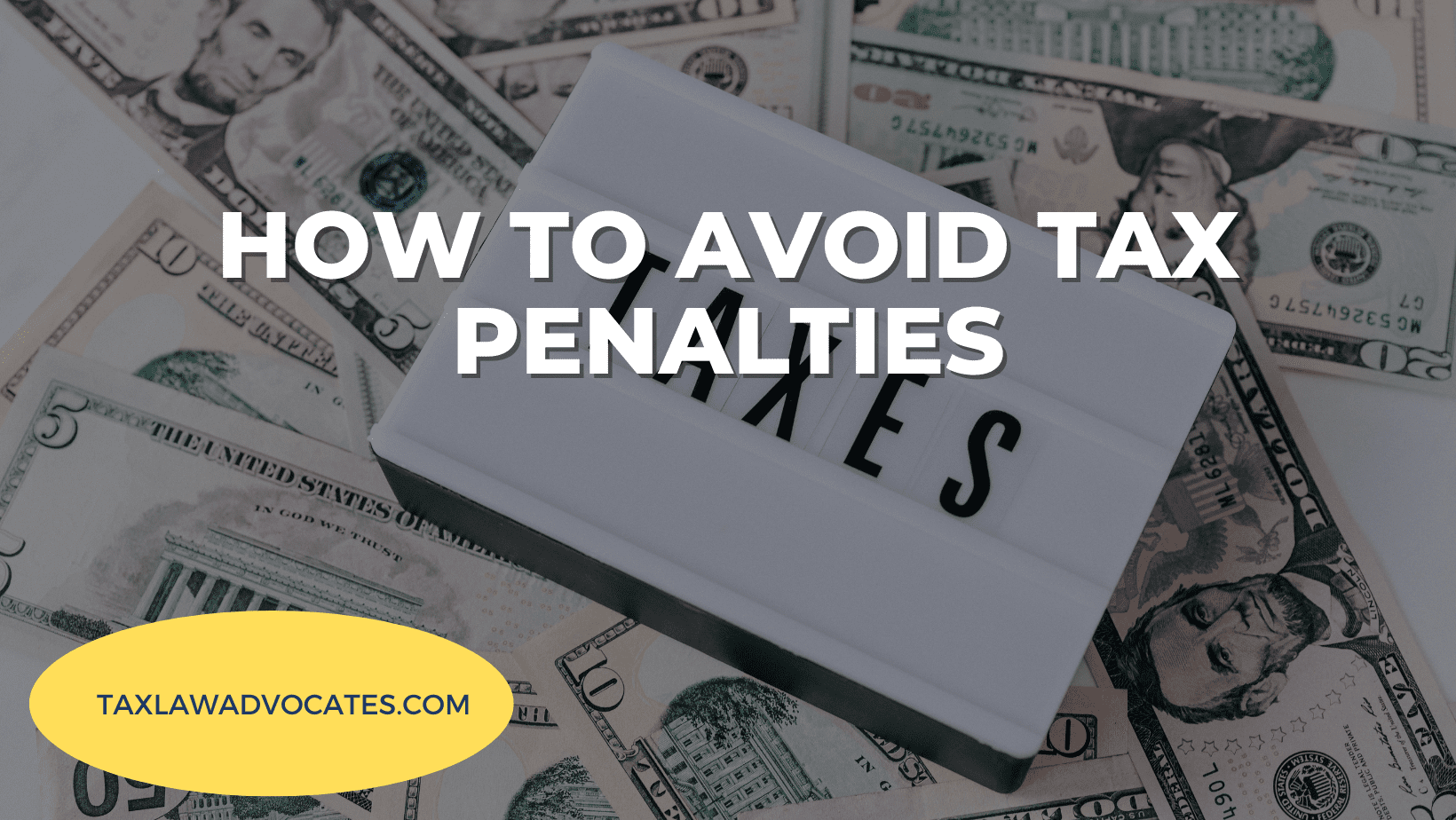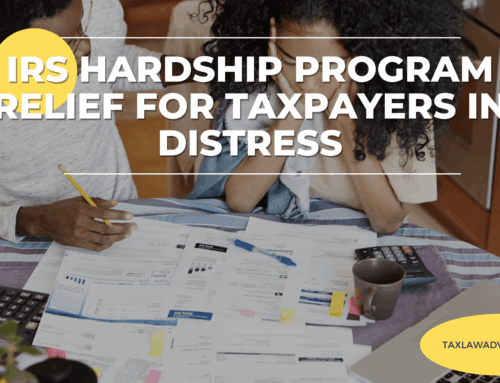When filing taxes, even minor errors can lead to costly penalties from the IRS. Whether it’s missing a deadline, miscalculating estimated taxes, or bouncing a check, tax penalties can add financial stress to an already complicated process. Fortunately, you can take steps to avoid these penalties and remedies if you’ve already been hit with one. In this blog, we’ll cover common tax filing mistakes that lead to penalties, steps you can take to avoid them, and what to do if you receive a penalty from the IRS.
At Tax Law Advocates, we specialize in helping individuals and businesses resolve tax issues and avoid penalties. If you’re dealing with tax debt or need assistance navigating the tax system, contact us at 855-612-7777 or visit our website.
Common Tax Filing Mistakes That Lead to Penalties
The IRS imposes penalties for a variety of reasons, from failing to file your tax return on time to underestimating your quarterly payments. Here are some of the most common tax penalties and how you can avoid them.
1. Failure to File
The most common mistake taxpayers make is failing to file their tax returns by the deadline. In 2024, tax returns are due on April 15. If you need more time to file, you can request an extension, which gives you until October 15 to submit your return. However, if you miss the deadline without filing for an extension, the IRS will charge you a failure to file penalty.
The penalty is 5% of your unpaid taxes for each month your return is late, up to a maximum of 25% of your total tax liability. If your return is more than 60 days late, the minimum penalty is $450 or 100% of the tax owed—whichever amount is less.
How to avoid it: Always file your tax return by the deadline or file for an extension if needed. Even if you cannot pay the full amount owed, submitting your return on time can help you avoid this costly penalty.
2. Failure to Pay
Even if you file your return on time, failing to pay the full amount of tax you owe by the April deadline will result in a failure to pay penalty. This penalty is 0.5% of the unpaid taxes for each month or part of a month you’re late, up to a maximum of 25% of the tax due.
If you set up an installment agreement with the IRS, the penalty is reduced to 0.25% for each month the agreement is in place.
How to avoid it: If you can’t pay the full amount by the deadline, pay as much as you can to minimize the penalty. Additionally, setting up an installment plan can reduce the penalty and give you more time to pay off the remaining balance.
3. Failure to Pay Proper Estimated Taxes
The IRS operates on a “pay-as-you-go” system, which means you are required to pay taxes throughout the year as you earn income. If you are self-employed or receive significant income outside of regular employment, such as through investments or freelance work, you may need to make quarterly estimated tax payments. If you fail to pay enough tax during the year, the IRS may charge an underpayment penalty.
To avoid this penalty, you must either:
– Pay at least 90% of your total tax liability for the current year, or
– Pay 100% of your prior year’s tax liability (or 110% if your adjusted gross income exceeds $150,000).
How to avoid it: Ensure you’re withholding enough tax from your paycheck or making accurate estimated quarterly payments. You can use the IRS’s tax withholding estimator to check if you’re on track.
4. Dishonored Check
If you send a payment to the IRS by check and it bounces due to insufficient funds, the IRS may charge a dishonored check penalty. The penalty is 2% of the check amount unless it’s less than $1,250, in which case the penalty is $25 or the check amount—whichever is lower.
How to avoid it: Ensure that your bank account has sufficient funds to cover your tax payment before mailing a check. Alternatively, you can set up automatic payments or use other electronic payment methods.
Steps to Take to Avoid These Common Mistakes
Tax filing mistakes can be costly, but they are avoidable with proper planning and organization. Here are steps you can take to ensure you don’t fall into common traps that lead to penalties:
- File On Time: If you know you can’t meet the April 15 filing deadline, request an extension to avoid the failure to file penalty. This gives you an additional six months to complete your return.
- Pay What You Owe: Even if you can’t pay the full amount, paying as much as you can by the deadline will reduce the failure to pay penalty. Set up an installment agreement for the remaining balance to minimize penalties.
- Make Estimated Payments: If you receive income that doesn’t have tax withheld, make sure to pay quarterly estimated taxes. Mark your calendar for the quarterly deadlines: April 15, June 15, September 15, and January 15.
- Check Your Withholding: If you’ve had a significant life change (marriage, new job, or a second job), you might need to adjust your tax withholding. Use the IRS withholding calculator to ensure you’re on track.
- Keep Good Records: Maintain records of your income, expenses, and tax payments throughout the year. Organized documentation will make it easier to file an accurate return and avoid mistakes.
What to Do If You Receive a Penalty
If you’ve already received a penalty from the IRS, it’s important to address it promptly to avoid additional interest and penalties. The good news is that the IRS offers penalty abatement in some cases. Here are two ways you might be able to get a penalty reduced or waived:
1. First-Time Penalty Abatement
If this is the first time you’ve received a penalty, you may be eligible for first-time penalty abatement. To qualify, you must:
– Have filed all your tax returns on time (or have extensions in place),
– Have paid your taxes or set up a payment plan, and
– Not have had any penalties in the past three years.
2. Reasonable Cause
The IRS may waive penalties if you can show that you had a reasonable cause for not filing or paying on time. This can include situations like a natural disaster, medical emergency, or family death.
At Tax Law Advocates, we specialize in negotiating with the IRS to reduce or eliminate penalties. If you’ve received a penalty and need help, contact us today at 855-612-7777 or visit us online. Our team of federally licensed enrolled agents, tax attorneys, and accountants will work with you to resolve your tax issues and get you back on track.
Conclusion
Tax penalties can add up quickly, but with the right approach, you can avoid them or reduce their impact. Whether it’s filing on time, paying what you owe, or seeking penalty abatement, there are solutions available to help you manage your tax obligations.
If you’re facing tax penalties or need assistance navigating the complexities of tax law, contact Tax Law Advocates at 855-612-7777 or visit our website for expert guidance. Let us help you avoid penalties and resolve your tax issues for good.






